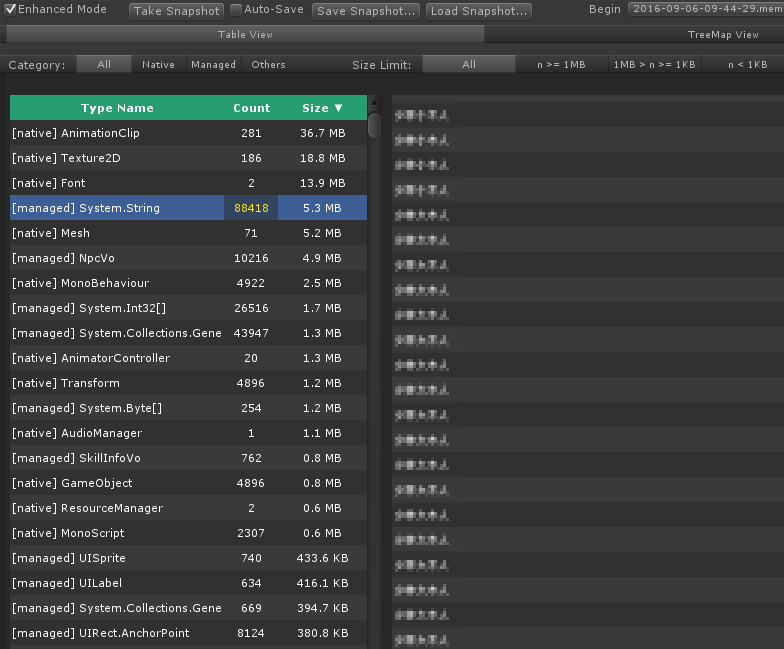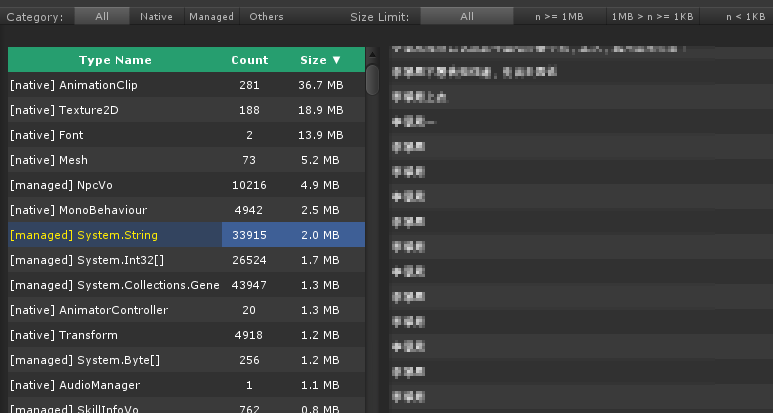Unity 游戏的 string interning 优化
问题描述
在开始之前,先说一下这个问题为什么很容易被忽视吧。
通常情况下,我们难以注意到运行着的 Unity 程序内 string 的实例化情况。这些字符串的创建,销毁的时机是否合理,是否存在有重复 (相同内容的字符串),冗余 (存有已不再有意义的垃圾字符),低效 (capacity 远大于 length),以及泄漏 (没有在期望的时机及时销毁) 的情况就更容易被忽视了。由于 string 没法随时像普通的 Unity 对象那样通过调用 Object.GetInstanceID() 来查看实例id,我们不太容易感知字符串对象的实际内存开销。其实要不是偶然在工具里发现了大量的此类情况,俺也没想到看起来颇单纯的 immutable string 里居然隐藏着这么多秘密。
一次只说一件事,这次我们只讨论重复字符串的问题。
使用自制工具 ResourceTracker,可以发现 Unity 游戏运行时 mono(il2cpp) 内有大量重复的字符串,如下所示:
手动 Intern()
对 .Net 特性有了解的同学,应该知道 C# 同 Java 一样,提供了一套内建的 string interning 机制,能够在后台维护一个字符串池,从而保证让同样内容的字符串始终复用同一个对象。这么做有两个好处,一个是节省了内存 (重复字符串越多,内存节省量越大),另一个好处是降低了字符串比较的开销 (如果两个字符串引用一致,就不用逐字符比较内容了)
但是为什么上面的 Unity 程序内仍然有大量的重复字符串呢?
查看他们的地址,发现彼此各不相同,说明的确没有引用到同一块内存区域。由于 C# 语言实现以静态的特性为主,俺推测,也许只有编译期可以捕捉到的字符串 (也就是通常用字面字符串 literal string 来构建时) 才会 interning。
做个实验吧:
|
|
运行上面的代码,输出结果分别是 True 和 False。嗯,也就是说,即使运行时内容一样 (== 返回 True),手动在运行时拼出来的字符串也不会自动复用已有的对象。查看游戏代码,发现很多重复字符串是通过解析 binary stream 或 text stream 构造出来的,这样就解释得通了。(String literals get interned automatically)
手动 Intern 一下试试吧。
|
|
注意,C# 并没有提供“清除已经 Intern 的字符串”的接口。也就是说,如果不由分说地把产生的字符串都扔进去,会造成大量短生命期字符串 (如某个地图上特有的特效名) 在全局池内的堆积。
解决这个问题并不难,手写一个可清除的版本就可以了。
可清除的 Interning - UniqueString
下面的 UniqueString 类除了提供两个与 string.Intern() 和 string.IsInterned() 一致的接口外,还提供了 Clear() 接口用于周期性地释放整个字符串池,可在地图切换等时机调用。这个类通过判断参数来确认,是将字符串放入全局的系统池,还是支持周期性清理的用户池。
|
|
通过参数 removable 我们可以指定使用默认 intern 还是 removable-intern。显式地指定后者的字符串将可被随后的 UniqueString.Clear() 清理。
UniqueString 的实现 (及更新) 在这里。
效果
使用上面的机制在关键点加了几行代码简单地优化后,内存中的字符串从 88000 条降低到 34000 条左右 (仍有很多重复存在)。
小结
- 直接写在代码里的常量字符串 (即所谓的 literal string) 会在启动时被系统自动 Intern 到系统字符串池;而通过拼接,解析,转换等方式在运行时动态产生的字符串则不会。
- 避免在 C# 代码里写多行的巨型 literal string,避免无谓的内存浪费。常见的情况是很大的 Lua 代码块,很密集的生成路径,大块 xml/json 等等,见下面的例子。
- 已经被自动或手动 Intern 的字符串在之后的整个生命期中常驻内存无法移除,但可以使用上面提供的
UniqueString类实现周期性的清理。
下面是一些不合理的常见的代码内的常量字符串的情况 (都是常驻内存无法释放的)
|
|
附:
- Understanding C#: String.Intern makes strings interesting 是很好的材料,对弄清楚 intern 的一些 dirty 细节非常有帮助
(全文完)

